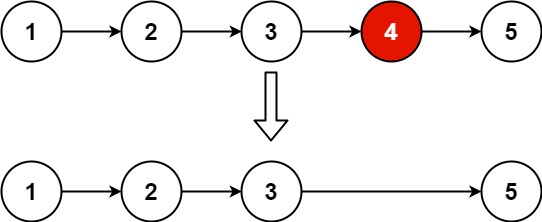【LeetCode】19. Remove Nth Node From End of List 解題報告
19. Remove Nth Node From End of List / Medium
Given the head of a linked list, remove the nth node from the end of the list and return its head.

Example 1:
Input: head = [1,2,3,4,5], n = 2
Output: [1,2,3,5]
Example 2:
Input: head = [1], n = 1
Output: []
Example 3:
Input: head = [1,2], n = 1
Output: [1]
Comstraints
- The number of nodes in the list is sz.
- 1 <= sz <= 30
- 0 <= Node.val <= 100
- 1 <= n <= sz
Solution 1: 2 Pass
思路
其實是很直覺的想法,先算出整個 List 有多長,減去 n 就是我們要消除的 index 了。都是很簡單的 Linked-List 操作。
只是如果我們要消除的第 n 個 node 其實是 head 就會麻煩一點,必須單獨一個 if-condition,為了簡化操作,
我們在 head 前多宣告一個 dummy head node,並將 dummy node 作為 head 進行操作,最後只要回傳 dummy 的下一個節點即可。
效能
Complexity
- Time Complexity: O(N)
- Space Complexity: O(1)
LeetCode Result
- Runtime: 0 ms
- Memory Usage: 10.7 MB
- https://leetcode.com/submissions/detail/530506512/
Code
1 | class Solution { |
Solution 2: 1 Pass
思路
前一個解法需要兩次在 List 上做搜尋和操作,第一次要 n 次,最差的狀況 n = 1,第二次搜尋也要 n-1 次,嚴格來說時間複雜度是 2N。
那我們能不能只遍歷一次 List 就好?
可以!
因為要尋找的是倒數第 n 個,也就是說倒數第 n 個 node index 跟最後的 index 相差了 n-1,
如果我們能有兩個指標 - 快慢指標,兩者 index 剛好相差為 n,這樣一來快指標跑到最後一個 node 的時候,慢指標剛好會落在我們要消除的 node 的前一個。
於是,我們便能輕易地刪除掉倒數第 n 個 node,最多遍歷 n 次。
但可能因為 LeetCode 的測資太小,實際上和第一種解法並沒有速度上的優勢,甚至還慢一點(應該是運行誤差)。
效能
Complexity
- Time Complexity: O(N)
- Space Complexity: O(1)
LeetCode Result
- Runtime: 4 ms
- Memory Usage: 10.8 MB
- https://leetcode.com/submissions/detail/530623344/
Code
1 | class Solution { |
